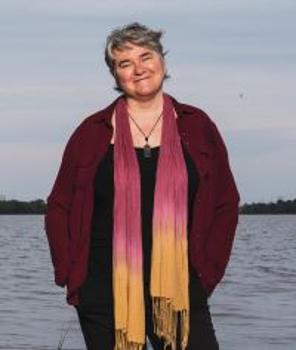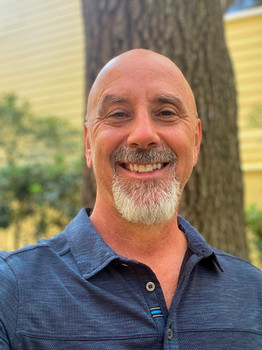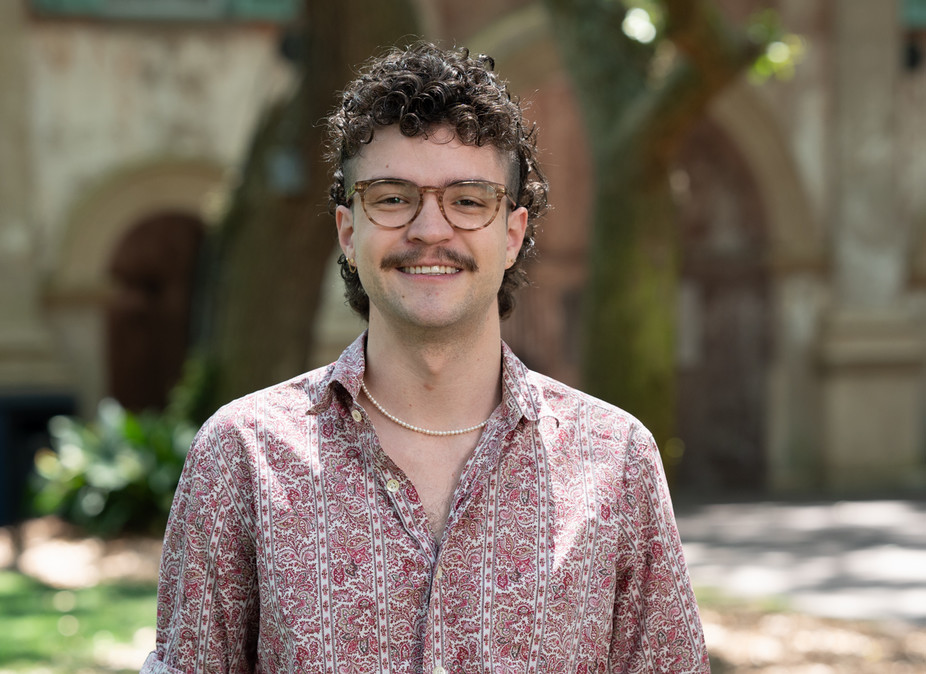Contact Us
Our FYE Office consists of two main teams, each overseeing different aspects of your FYE course:
The FYE Team
Jen Wright , Ph.D. (Director) and Nicholas Principe (Associate Director)
Students: Please direct any questions regarding courses, registration, or holds to the FYE Team at fye@cofc.edu using your official CofC email and include your CWID in the subject line.
The FYSS Team
Jennifer Smuniewski (Director) and William Roebuck (Associate Director)
Students: Please direct any questions regarding your FYSS to the FYSS Team at roebuckwt@cofc.edu using your CofC email and include your CWID in the subject line.
Office Location
First Year Experience
Lightsey Center Lower Level, Suite B53
Charleston, SC 29424
843-953-3850
Meet our Staff
-
Jen Wright (Director, FYE)
Jen Wright, Ph.D.Director, FYEOffice: Lightsey Lower Level, Room B55Email: wrightjj1@cofc.eduPhone: 843-953-1449

Jen Cole Wright is a Professor of Psychology and Director of the First Year Experience. As director of this vibrant program, she recruits talented faculty to teach First Year Seminars and Learning Communities. In addition to the development and scheduling of these courses, she helps to develop faculty professional development programs to facilitate campus conversations about teaching and learning in the first year and beyond. She is a strong believer in the transformative value of studying abroad and facilitates optional one-credit spring break trips for freshmen.
Jen teaches introductory courses in psychology and lifespan development, but her passion lies in courses on the psychology of human conflict and social change—teaching courses like Psychology of War and Conflict, Psychology of Oppression, Resistance, and Regeneration, and Psychology of Social Change. She has been teaching in the First Year Experience program since 2009, teaching both seminars and learning communities with other faculty across campus. She has been a faculty fellow in both the Honors Department and the Center for Sustainable Development. And she serves as a thesis advisor for graduate students in the MS in Environmental and Sustainability Studies, and MES/MPA dual program, as well as the faculty advisor for on-campus student groups like the Vegan Club, Sustainable Fashion, the Charleston Area Justice Ministries CofC student group, the Stone Soup Collective, and the Human Rights Alliance. And for over a decade, Wright has also led College of Charleston summer study abroad programs to Cambodia and Vietnam, as well as Rwanda and Uganda.
Jen received her Ph.D. in Developmental Psychology and M.A. in Philosophy from the University of Wyoming, doing most of her undergraduate work at Bennington College and the University of Colorado, Boulder. She specializes in moral psychology, studying the development and function of virtue (with a particular focus on humility), and the ways children, adolescents, and adults navigate the moral domain, including how the process and react to moral differences and disagreement. She has published over fifty articles and four books, including A Psychological Perspective on Folk Moral Objectivism (2023, Routledge Press), Understanding Virtue: Theory and Measurement (2020, Oxford Press), an edited volumes on Humility (2019, Oxford Press), and Advances in Experimental Moral Psychology (2014, Bloomsbury Publishing). Of particular interest to Wright is how people understand the nature and function of morality and how they use it to shape, control, and protect collective well-being and individual autonomy, balancing between promoting a diversity of beliefs, values, and practices, while discouraging (and prohibiting) those beliefs, values, and practices that cause harm.
Off campus, Jen helps direct a local non-profit seeking to raise awareness about climate change and environmental injustice, building towards a climate resilient and equitable future for the Lowcountry, and mentors other fledgling organizations in the social and environmental justice sphere. -
Nicholas Principe (Associate Director, FYE)
Nicholas PrincipeAssociate Director, FYEOffice: Lightsey Lower Level, Room B64Email: principend@cofc.eduPhone: 843-953-2153
 After spending most of my life in the Southeast, I moved to Charleston in 2013 and absolutely love living here. I have two wonderful adult kids, one of whom graduated with a double major from The College of Charleston and the other is a successful chef here in town. My relationships with family and friends are incredibly important to me and, as anyone who knows me will tell you, I have a strong passion for our natural world. I am a Lowcountry Master Naturalist, which means when I'm not working, I'm typically outside, birding, catching reptiles, taking macro photos of insects, or volunteering on conservation projects here in the Lowcountry. I love learning new things and then applying what I've learned in a way that is in service to others and to our planet.I fell in love with teaching when I started working as a lab instructor at Ursinus College, a small liberal arts college just outside of Philadelphia. I worked there for 10 years as a full-time instructor, teaching, advising, and conducting research, but it was their Common Intellectual Experience course for first year students that became my favorite course to teach. There, we explored larger questions about what it means to be human and what our place is in the universe through the lens of readings such as The Epic of Gilgamesh, Socrates, Galileo, and Descartes. I began teaching at CofC in 2017 in Environmental and Sustainability Studies and then taught my first First Year Experience (FYE) course called "Fish, Fisheries, and Food for the Future" in 2018. My passion for teaching and my commitment to our CofC FYE Program prompted me to successfully apply to be the first ever FYE Faculty Fellow for 2023-24. The combination of teaching in FYE and working behind the scenes as FYE Fellow was a truly rewarding experience and I was thrilled to accept the position of Associate Director of CofC's FYE Program in May 2024.
After spending most of my life in the Southeast, I moved to Charleston in 2013 and absolutely love living here. I have two wonderful adult kids, one of whom graduated with a double major from The College of Charleston and the other is a successful chef here in town. My relationships with family and friends are incredibly important to me and, as anyone who knows me will tell you, I have a strong passion for our natural world. I am a Lowcountry Master Naturalist, which means when I'm not working, I'm typically outside, birding, catching reptiles, taking macro photos of insects, or volunteering on conservation projects here in the Lowcountry. I love learning new things and then applying what I've learned in a way that is in service to others and to our planet.I fell in love with teaching when I started working as a lab instructor at Ursinus College, a small liberal arts college just outside of Philadelphia. I worked there for 10 years as a full-time instructor, teaching, advising, and conducting research, but it was their Common Intellectual Experience course for first year students that became my favorite course to teach. There, we explored larger questions about what it means to be human and what our place is in the universe through the lens of readings such as The Epic of Gilgamesh, Socrates, Galileo, and Descartes. I began teaching at CofC in 2017 in Environmental and Sustainability Studies and then taught my first First Year Experience (FYE) course called "Fish, Fisheries, and Food for the Future" in 2018. My passion for teaching and my commitment to our CofC FYE Program prompted me to successfully apply to be the first ever FYE Faculty Fellow for 2023-24. The combination of teaching in FYE and working behind the scenes as FYE Fellow was a truly rewarding experience and I was thrilled to accept the position of Associate Director of CofC's FYE Program in May 2024.Our FYE program is incredibly unique, blending both a peer facilitator-led seminar with a wide selection of courses taught by talented faculty, and my goal is to continue to help this program thrive and grow into the future by bringing to it all of my energy, experience, and passion.
-
William Roebuck (Associate Director, CEPE)
William RoebuckAssociate Director, CEPEOffice: Lightsey Lower Level, Room B65Email: roebuckwt@cofc.eduPhone: 843-953-1299

I am a South Carolina native and 2023 CofC alum holding a B.S. In Sociology and a B.A. in German Studies with minors in Psychology and European Studies. During my time as a student at the College, I served as an Orientation Intern, Bridge Student Peer Mentor, and Customer Service Representative for the Office of New Student Programs. I love to travel and some of my favorite memories include backpacking around Europe before starting at CofC and participating in a Maymester in Berlin, Germany!
Post-graduation, I had the opportunity to become a Site Director for the iCharleston Program working with incoming Students in their first semester abroad in Rome, Italy, and upon their matriculation to the College in the following Spring semester. I love helping students find their passion and discover that they are capable of success in a collegiate setting and beyond, which is why I am grateful for the opportunity to work with our Peer Facilitators and other student leaders on CofC's campus.
In my free time, I enjoy exploring the ever-changing food scene in Charleston, spending time with friends, and relaxing with my two pups!
Anyone who has never made a mistake has never tried anything new.
Albert Einstein